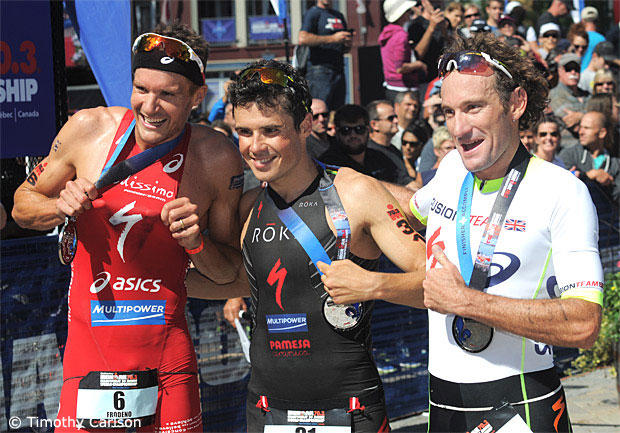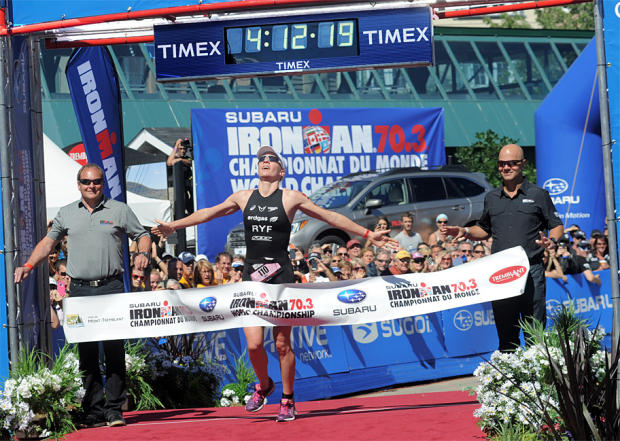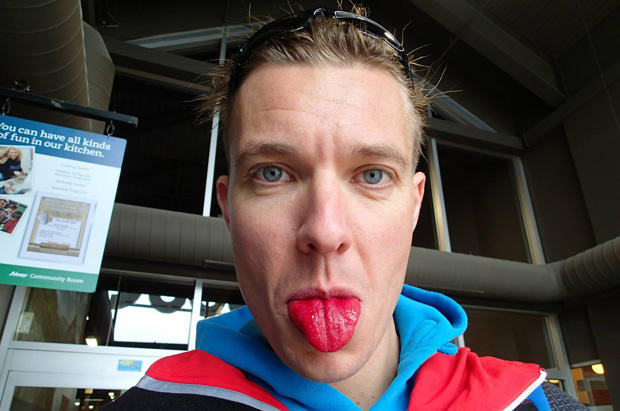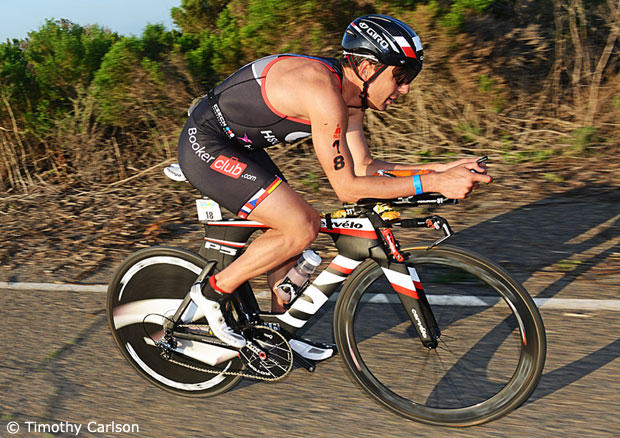From Qatar to Mt Tremblant – late
Ryan Christian was 4th in the M25-29 age group at the Subaru Ironman 70.3 World Championships in Mont Tremblant, Canada, but the Aussie who resides in Qatar almost missed the race. He thought the race was on September 14. We however will forgive him that error, as he is very new to this sport.
Slowtwitch: Thanks for your time Ryan.
Ryan Christian: My pleasure. It’s actually very exciting to be interviewed by ST. So thank you!
ST: You finished the 70.3 World Championships in 4:07:02 and that meant 4th place in the 25-29 age group, and 7th age grouper overall. I assume you were pleased.
Ryan: Yeah, it’s always very difficult to assess how you feel post race, with many mixed feelings. Obviously 7th non-pro is a great achievement and I’m definitely extremely pleased with it. Then again, unless you finish first there’s always some part of you that wonders if you could have done something more. But I guess that’s what drives us to keep going, keep pushing and striving for bigger and better results.

ST: As you got ready for Mont Tremblant, what was your goal and did you have a target time?
Ryan: To be honest, I wasn’t really concerned with a target time. Being a championship race, and with the Mt Tremblant course not having a huge reputation as being super fast, I actually never really put much thought into a target time. Throughout the year my goal was always to win my age group and so as I got ready for the race, my goals for each leg were all focused on what would be needed to achieve that. I knew it would require a huge PB to win, and although I executed my race pretty close to my plan, the front guys in my age group were just too strong for me to compete with.
ST: It sounds like there was a target time.
Ryan: Not exactly, the target was to come out of the swim either in the first main pack or not too far behind the first pack. The target for the bike was to try average 39km/hr or faster, but I didn’t want to have to push too much more than 4W/kg in order to do so. And in the run the plan was to run the first lap slightly conservative and hopefully come home strongly and pass anyone left in the second lap.
ST: Did you know any of the competitors you were facing in your age group?
Ryan: Actually no, not at all. I didn’t really want to spend too much time and energy worrying about what others were going to do. I had a rough idea of what would be required to win and that’s what I put my focus towards. Unfortunately we had a very strong age group and what I thought would be required to win wasn’t quite enough.
ST: Being first would likely be popular with most folks, but how realistic would it have been for you, especially considering your limited experience?
Ryan: Well it turns out my time was faster than the winners of both the age group below and above. So although it was a fairly ambitious goal I’m not sure it was too unrealistic.
ST: People complained about heavy drafting on the course. Is that something you noticed?
Ryan: Yeah, definitely. I think it was impossible not to notice the “draft fest”. But in all fairness I don’t think it’s something that could be avoided easily by the athletes. Although my experience is quite limited, it just seemed that there was simply too many athletes of similar ability coming out of the water so close together and no where for them to go. The options would have been to a) light pedal and continue to drop back as riders passed you or to b) push too hard in an effort to pass all the riders in front, which in the early stages of my bike leg was a never ending line of riders bunched very close together with nowhere to slot in. It was very bad at times but it did clear up for a lot of the middle section as well.

ST: So can drafting in big championship events not be avoided?
Ryan: Yes, I’m sure it could have under different circumstances. However, given the amount of athletes, wave sizes and time gaps between waves I think it was quite a big ask. I think it was pointed out in a comment on your site that even if the 2700 athletes were evenly spread across the 90km course that there would only be 33m separating each rider. So when you consider that waves of up to 500 athletes were exiting the water onto an already congested racecourse within roughly 10 minutes of each other, it makes the scenario fairly inevitable.
ST: Word has it that you almost missed the race because you had booked your flights from Qatar to Canada a few days after the actual race date.
Ryan: Ahhh yes, a massive schoolboy error on my part! Not sure how, but for some reason I always had it in my mind that the race was on the 14th and not the 7th. I was also so confident in this, that I had managed to book all my flights and accommodation around a race date of the 14th.
ST: At what point did you realize that the actual race date was sooner than you had it on the calendar?
Ryan: It actually wasn’t until the morning of Thursday the 4th that I got a message from a mate saying “good luck for the race this weekend” and realized I had messed up. I then had to book entirely new flights and accommodation and get on a direct flight from Doha to Montreal 20 hours later, which made the pressure on a successful result all the more intense.
ST: Did you message that mate back and ask him why he is so early with his well wishes?
Ryan: Haha actually no, I straightaway looked it up online and then had an impromptu meeting with a few friends/colleagues who all told me if it was possible to still make it that I had to go! I did give him a big thank-you later, once I had sorted out all my new flights and got my leave and exit permit approved. In Qatar we need to gain approval from our employers to exit the country.

ST: It sounds like your employer is fine, but is it scary to think that you leaving the country is up to the boss?
Ryan: Yeah it is a little scary and you do hear of some horror stories for some of the labor workers here in Qatar. However, within the company that I work for, as long as your manager has approved your time off work, the exit application is just a simple request to HR that is processed in just a few hours. Luckily, in my position getting the time off work approved is also a quick, uncontested process.
ST: When did you arrive, and how far away from the race venue did you have to stay?
Ryan: I was lucky that Qatar Airways had a direct flight to Montreal Friday morning. So after arriving into Montreal, I caught a city bus into town and then another bus from Montreal to Mt Tremblant and arrived to the hotel late Friday night. Which meant I had missed registration, creating just a little bit more anxiety and nervousness. Luckily my hotel was right next to the transition area and I managed to get everything sorted easily the next day.
ST: You are Australian but you live in Qatar. When did you move there and what do you do there?
Ryan: Yeah, I’m working in Doha at Aspetar, a sports medicine and orthopedic hospital. I’ve been there almost 3 years now, where I’m doing research in exercise physiology as part of my doctorate.
ST: How much longer do you have to go?
Ryan: The goal is to submit my thesis by the end of the year. Inshallah (god willing in Arabic)
ST: I believe you have been participating in triathlons for only 2 years. What kind of sports did you do prior?
Ryan: Yes that’s right. I attempted my first 70.3 in St Croix last year, where I actually failed to finish. Before I moved to Qatar I was a competitive distance runner in Australia, I would run track during the summer, mainly 3000m steeplechase and the 5000m and road races up to half marathon distance in the winter.

ST: What got you started in triathlon and what was your first race?
Ryan: Well when I moved to Qatar I was actually injured and had a strong lack of motivation for running. With Qatar being a country with a very sedentary lifestyle, very few elite endurance athletes and not the most conducive training environment I soon lost a lot of fitness and began putting on a few kilograms. I had a few colleagues, who are now very good friends and have been very influential in my development as a triathlete who were cycling regularly and training for the Abu Dhabi triathlon. They encouraged me to join them for some rides and having grown up doing swim squad as a junior and surf life saving during high school it wasn’t such a surprise that once my cycling started to develop that I had some potential in triathlon. I did my first triathlon, the sprint distance in Abu Dhabi in 2012.
ST: You mentioned the 2013 St. Croix being your first Half, but you did not finish. What happened?
Ryan: Yeah, the St. Croix experience has proved to be a huge motivational factor for me. I went into the race under prepared and with little experience running off the bike, only having done a handful of sprint and olympic distance races. I blew up big time on the run and was suffering pretty bad after the first lap and decided to pull the pin. I was actually pretty ashamed of pulling out and vowed to never pull out of a race again.
ST: Where did you qualify for Mont Tremblant?
Ryan: I qualified at St Polten in May, which was the first 70.3 that I managed to execute to plan. After St Croix, I made several more attempts racing Luxembourg, Mandurah and Auckland with very inconsistent results. So it wasn’t until St Polten that I finally put it all together, had a really good run split, and finally gave myself some confirmation that I had some potential at the distance.
ST: It sounds like you dove into the sport head on once you did that first race. What in that Abu Dhabi race told you that this sport was for you?
Ryan: Well I managed to win that race which was pretty exciting. Although the sprint distance race wasn’t the world’s most competitive field it was still pretty encouraging to win my first race and I just thought that maybe I had the tools to build up to something. When I would compare my PB for the half marathon (68.13), to the times that the top age groupers were running for the same distance off the bike, I thought If I could improve my bike and learn to run off the bike then maybe I could be competitive with these guys. I also had a lot of encouragement from the guys at work that I mentioned. One was an ex-ITU pro and another had just qualified for the long-course world championships and so their belief and support, as well as my motivation to exceed their expectations were all very big contributing factors.

ST: So what is next?
Ryan: I’m actually really not sure at this stage. I’m contemplating stepping things up and training/racing full time as a pro next season. I will most likely race a few half ironman distance races in the region (Dubai and Bahrain) towards the end of the year and then then try and combine a trip back home early next year with with few 70.3’s (Geelong and Auckland).
ST: What is the barometer for you to go Pro?
Ryan: I think the progress I have been making while training in Qatar is a good indication that I have the potential. Challenge Bahrain in December will be a good barometer. It will be good to see how much more progress in can make in the next few months with some better training weather. The last 3 months leading up to Mt Tremblant were the 3 hottest of the year, with daytime temperatures rarely dropping below 40 degrees Celsius, which meant a lot of training on the turbo, and treadmill, which wasn’t ideal. It all really depends on whether I can obtain sufficient sponsorship to be able to throw everything at it. I.e. putting a post doc on hold, training full time, being able to get to enough races and being able to spend some more time training somewhere with a more conducive environment.
ST: Is there anything else we should know?
Ryan: Not that I can think of. Thanks again!








Start the discussion at forum.slowtwitch.com